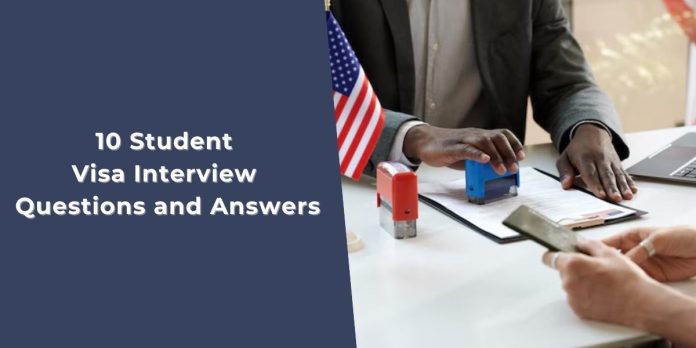Getting into an international university is super exciting, but the student visa process can be a bit nerve-wracking. Without a visa, you can’t enroll in your chosen program, so it’s really important to be well-prepared for the visa interview.
Consular Officers might rephrase questions during the interview, so it’s good to have your responses ready. The main goals of the interview are to verify your intent to study, check your financial stability, and see if you’re ready for the academic program you’ve chosen.
Here’s a list of common student visa interview questions with sample answers to help you prepare.
10 Common Student Visa Interview Questions and Answers:
- Where are you going? This question is about your destination (school), purpose (course and research work), and the duration of your stay. Try to keep your answer short, ideally within three sentences unless the officer asks for more details. Sample Response: I am going to Oklahoma State University to pursue a Doctoral degree in XYZ with a focus on ABC, working with Professor EFG on research related to ABCD.
- Why this school? Explain why you chose this particular institution. It could be due to the faculty’s research interests, the institution’s global ranking, or its beautiful campus. Sample Response: I chose Oklahoma State University because of Dr. XYZ’s research on ABCD. This university will provide me with the expertise and networking opportunities I need to become a Research Analyst at XXX after graduation.
- Why this program/course? This question asks you to explain why you are passionate about this course and its importance for your future. Be clear and to the point. Sample Response: I chose to study mathematics because I’m passionate about developing and applying mathematical models for eco-friendly engineering, and Dr. ABC’s research aligns perfectly with my interests.
- What is your study plan? Or Tell me about your program? A detailed study plan reassures the visa officer that you are well-prepared for your academic journey. Programs funded by the US government usually require a minimum CGPA of 3.5/4.00 per semester for continued funding. Graduate students often need to work as Teaching or Research Assistants. Sample Response: I will be pursuing a Master’s degree in Chemistry at Ohio State University for two years. The program starts on September 18, 2023, and ends on January 15, 2025. I will work with Dr. XYZ on research, teach undergraduates for 20 hours a week, and attend 9 credit hours of courses.
- What do you do? This question checks how your current job or daily routine aligns with your future program. Make sure your current role and past courses are relevant to what you plan to study. Sample Response: Currently, I work as a Research Assistant in the Chemistry Department at ABC University. My responsibilities include [tasks and responsibilities].
- Can you tell me about your academic background? If you’re switching fields for your postgraduate studies, the officer might ask why. Use this question to highlight your academic achievements and research experience. Sample Response: I earned a Bachelor’s degree in Biology from ABC University in May 2015, graduating in the top 4% of my class. I have certifications in X, Y, and Z courses, and later pursued a Master’s degree at DEF University.
- How do you plan to finance your education? Clearly state whether you have full or partial funding from the government, an organization, or if you’re self-funding. Sample Response: I have been awarded a research and teaching assistantship that covers tuition, living expenses, and health insurance.
- How many schools did you apply to altogether? This question assesses your application strategy and seriousness about your academic goals. Sample Response: I applied to Oklahoma State University, Ohio State University, and Alabama State University. I was admitted to both Oklahoma and Ohio but chose Oklahoma for its strong Biology program and Dr. XYZ’s research interests. The 18:1 student-to-faculty ratio and the learning environment are exactly what I was looking for.
- Do you have anyone in the country you’re going to? This question checks if you have any relatives who migrated illegally. If you do, it might be a red flag. Sample Response: No, I do not have anyone there.
- Who is covering your deficit? If you have partial or no funding, explain how you plan to cover the remaining expenses. Sample Response: I will cover the remaining expenses from personal savings, accumulated from my job as a XXX at YYY, with an annual income of ABC.
FAQs
1. Can I apply for a visa if I have partial funding?
Yes, you can apply with partial funding, but you must clearly explain how you will cover the remaining costs.
2. How important is the school nomination for the visa process?
The school nomination is crucial as it shows the university’s support for your visa application.
3. What happens if I don’t meet the minimum CGPA required for funding renewal?
Not meeting the minimum CGPA could result in the loss of funding, so it’s important to maintain good academic standing.

